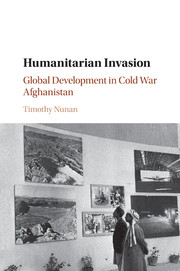Book contents
- Humanitarian InvasionGlobal Development in Cold War Afghanistan
- Global and International History
- Humanitarian Invasion
- Copyright page
- Dedication
- Contents
- Book part
- Note on Language and Transliteration
- Introduction
- 1 How to Write the History of Afghanistan
- 2 Afghanistan's Developmental Moment?
- 3 States of Exception, States of Humanity
- 4 From Pashtunwali to Communism?
- 5 Under a Red Veil
- 6 Borderscapes of Denial
- 7 The Little Platoons of Humanity
- Conclusion
- Bibliography
- Index
- References
Bibliography
Published online by Cambridge University Press: 18 December 2015
- Humanitarian InvasionGlobal Development in Cold War Afghanistan
- Global and International History
- Humanitarian Invasion
- Copyright page
- Dedication
- Contents
- Book part
- Note on Language and Transliteration
- Introduction
- 1 How to Write the History of Afghanistan
- 2 Afghanistan's Developmental Moment?
- 3 States of Exception, States of Humanity
- 4 From Pashtunwali to Communism?
- 5 Under a Red Veil
- 6 Borderscapes of Denial
- 7 The Little Platoons of Humanity
- Conclusion
- Bibliography
- Index
- References
Summary

- Type
- Chapter
- Information
- Humanitarian InvasionGlobal Development in Cold War Afghanistan, pp. 287 - 316Publisher: Cambridge University PressPrint publication year: 2016



